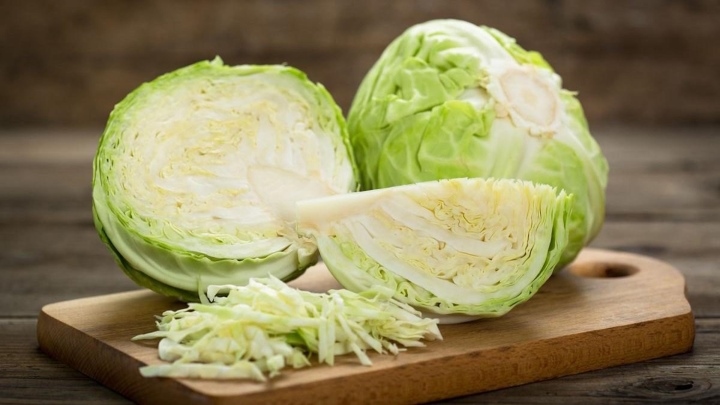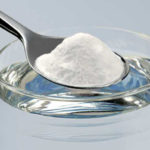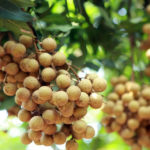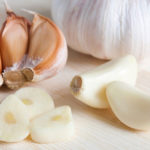Cabbage, a member of the cabbage family including Brussels sprouts and kale, is widely consumed in many Vietnamese households. With its diverse forms from smooth leaves to wrinkled leaves and various colors such as green, red, purple, and white, cabbage is not only attractive in appearance but also rich in nutrients. It stands out with low calorie content but high in vitamin C, vitamin K, and the ability to control blood sugar levels, helping to manage type II diabetes.
Cabbage is not only a smart food choice for those monitoring calorie intake but also a rich source of essential vitamins and minerals. With just 89g of raw green cabbage, you can get:
– Calories: 22
– Protein: 1g
– Fiber: 2g
– Vitamin K: 56% of the daily value
– Vitamin C: 36% of the daily value
– Folate: 10% of the daily value
– Manganese: 6% of the daily value
– Vitamin B6: 6% of the daily value
– Calcium: 3% of the daily value
– Potassium: 3% of the daily value
– Magnesium: 3% of the daily value
In addition, cabbage also contains essential nutrients such as vitamin A, iron, and riboflavin. It is worth noting that it is rich in vitamin B6 and folate, two nutrients necessary for energy metabolism and efficient nervous system function.
Cabbage is also a good source of dietary fiber and rich in antioxidants such as polyphenols and sulfur compounds. In particular, it contains a large amount of vitamin C, a powerful antioxidant that helps prevent heart disease, certain types of cancer, and limits vision loss.

Cabbage is also a good source of dietary fiber and rich in antioxidants
Anti-inflammatory effects
While acute inflammation plays an important role in protecting the body from infection and promoting healing, chronic inflammation can be associated with serious conditions such as heart disease, arthritis, and inflammatory bowel diseases. Cabbage, a member of the brassica family, contains antioxidants such as sulforaphane and kaempferol, which have been scientifically proven to reduce chronic inflammation. These powerful antioxidants in cabbage are believed to be the main reason cabbage has anti-inflammatory effects, reducing the risk of chronic inflammatory conditions.
Rich in vitamin C
Vitamin C, or ascorbic acid, plays multiple essential roles in the human body. It is not only necessary for collagen production – the most abundant protein in the body that provides structure and elasticity to the skin, but also ensures the stable functioning of bones, muscles, and blood vessels. Vitamin C also supports the body’s absorption of non-heme iron, the type of iron found in plant-based foods.
Moreover, the role of vitamin C as a powerful antioxidant has been extensively studied, particularly in cancer prevention. It helps protect the body from damage caused by free radicals, which are associated with many chronic diseases, including cancer.
A small cup of chopped red cabbage, about 89 grams, can provide up to 56% of the recommended daily intake of vitamin C, equivalent to what you would find in a small orange.

A small cup of chopped red cabbage, about 89 grams, can provide up to 56% of the recommended daily intake of vitamin C
Good for digestion
To improve digestive health, cabbage is a rich source of dietary fiber that cannot be ignored. Insoluble fiber in cabbage plays an important role in enhancing intestinal health and promoting bowel movements, helping to prevent constipation. In addition to stimulating bowel movements, insoluble fiber also contributes to increasing stool volume, facilitating smooth digestion.
Cabbage is also known for its ability to enhance beneficial bacteria in the gut, partly due to the fiber in cabbage serving as fuel for friendly bacteria such as Bifidobacteria and Lactobacilli. These beneficial bacteria not only help protect the immune system but also participate in the production of essential vitamins such as vitamin K2 and B12.
Therefore, incorporating cabbage into your daily diet is an effective method to support and maintain a healthy and efficient digestive system.
Protects the heart
Red cabbage stands out not only for its attractive color but also as a source of anthocyanins – a type of flavonoid that has powerful effects in reducing the risk of cardiovascular disease. A study in 2013 involving 93,600 women showed a link between consuming anthocyanin-rich foods and a reduced risk of heart attacks.
In addition, a meta-analysis of 15 observational studies also reflected similar results, showing a positive relationship between increased flavonoid consumption and a significant decrease in the risk of death from heart disease. Furthermore, supplementing daily diets with anthocyanins has been found to lower blood pressure and reduce LDL cholesterol levels, commonly known as the harmful type of cholesterol.
Red cabbage, with its valuable anthocyanin compounds, therefore becomes an essential food that cannot be ignored for those seeking to protect their cardiovascular health.

Red cabbage becomes an essential food that cannot be ignored for those seeking to protect their cardiovascular health
Controls blood pressure
Cabbage is a versatile food that can be prepared in various dishes, has low calorie content, is rich in vitamin C, and has effective blood sugar control. High blood pressure is currently one of the common health issues, affecting over one billion people worldwide and is a major cause of heart disease and stroke. According to recent studies, potassium – an essential mineral and electrolyte – plays an important role in regulating blood pressure, helping the body counteract the effects of sodium.
Potassium not only helps the body eliminate excess sodium through urine but also helps dilate blood vessels, thereby contributing to lowering blood pressure. Red cabbage, with a significant amount of potassium – providing 9% of the daily value in just 2 cups (about 178g) – is a good food choice for blood pressure control.
Adding cabbage to your diet is not only an interesting and tasty way to manage blood pressure but also supports maintaining a healthy blood pressure level. It is also an affordable vegetable, especially when in season and becoming popular in Vietnamese markets, making it a perfect choice for every family.
How to Effectively Treat Fishbone Issues at Home
Everyone loves feasting on the deliciousness of fish during the holidays. But, unfortunately, choking on fish bones is an unavoidable issue that may lead to devastating consequences if left unattended for a prolonged period. Let’s see how Dien May Xanh can help us out when fish bones get stuck in our throat.





































